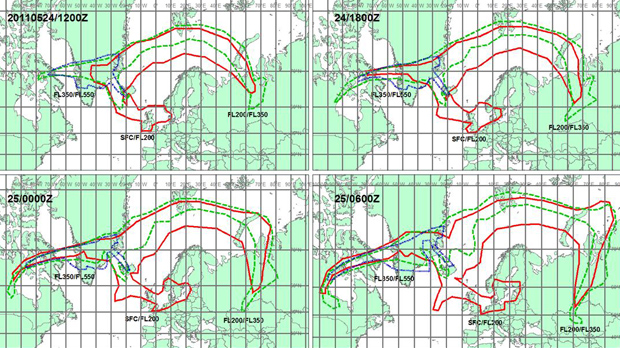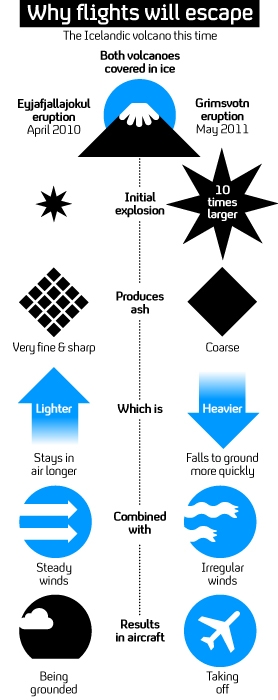Ash Cloud: ‘the worst is over’ says Icelandic Met Office
After a day of cancellations the Icelandic Met Office say that the ash plume from the Grimsvotn volcano has reduced 75 percent in size and will not seriously affect mainland European airspace.
Iceland’s Meterological Office told Reuters that the plume, once at 20km in height, is now reduced to just 5km and that it is likely that the eruption is ending rather than getting worse.
In addition, meteorologist Halldor Bjornsson said: “It all fits in with the same picture that the worst of this eruption is over.”
Seismic readings showed that eruptions were tailing off and it has been indicated that the size of the current plume will not create a big enough cloud to reach the airspace of mainland Europe.
German airports have indicated a temporary closure may take place on Wednesday as the cloud reaches the north of the country tomorrow morning, although this precaution at Hamburg and Bremen would likely be needed for only a short period.
Over the next 48 hours the cloud is predicted to peak over the UK and cover South East England where the majority of UK air traffic centres, but the Met Office have predicted that the cloud will have almost completely disappeared by 29 May.

Airline caution and backtracking
However it seems the reduction in emissions from the volcano has not abated the concerns of the airlines.
Easyjet have cancelled all their flights out of Scottish airspace and were surprisingly joined in this measure this afternoon by their low-cost rival Ryanair.
Earlier in the day, Ryanair owner Michael O’Leary had called the ash cloud mythical and attacked the Met Office for fabricating its existence: “You have to ask why a combination of bureaucratic incompetence in the CAA and the Met Office last night shut the skies over Scotland when this morning we have now confirmed there is no volcanic ash material in the atmosphere over Scotland.
“The Met Office produce these nonsensical forecasts of where this mythical ash cloud was going to go.”
Yet by 5pm the controversial boss had been advised by the Irish Aviation Authority that caution should be exercised, and all flights out of effected airports in Edinburgh and Glasgow were cancelled by the airline.

2010 blast versus 2011 blast
The Grimsvotn explosion is ten times bigger than the explosion at the Eyjafjallajokul volcano in 2010, but is having a far smaller an effect on the world’s airspace. Channel 4 News science correspondent Tom Clarke explains why from Iceland:
“The ash from this volcano – though more of it has been flung higher into the atmosphere – appears to be of a heavier and more grainy. That means it will fall back to earth before it spreads across too much of Europe’s airspace.
“The weather patterns also look more favourable. When Eyjafjallajokul was erupting, steady winds brought the ash towards the UK for weeks on end. Right now the weather is much less predictable but it looks that winds will continue to shift through this week, meaning it is unlikely a steady stream of ash will be brought to the UK.
“It also looks like forecasters are better equipped to predict the ash cloud’s behaviour this time.
“There are radar instruments now on the ground in Iceland that are allowing them to monitor the height and density of the ash cloud. This information was unavailable for last year’s eruption but is essential if you are trying to predict how far the ash might go and how thick it might end up being.”
Know your rights
Richard Lloyd, executive director of Which? magazine, has this advice for consumers.
"Travellers should still be prepared for delays and cancellations, but airlines and the CAA do not expect the volcanic ash to cause as much disruption as last year. If you do have a flight booked over the next few days, contact your airline before you go to the airport, and make sure they have your up-to-date contact details.
"If your flight is cancelled or delayed for over five hours, you should be offered a choice of a full refund or transfer to an alternative flight. However, the airlines don't have to compensate passengers for loss of any additional elements to holidays, such as accommodation and car hire. It may be possible to claim for these losses on travel insurance, but passengers will need to check their individual policies, many of which may now have specific exclusions built in."